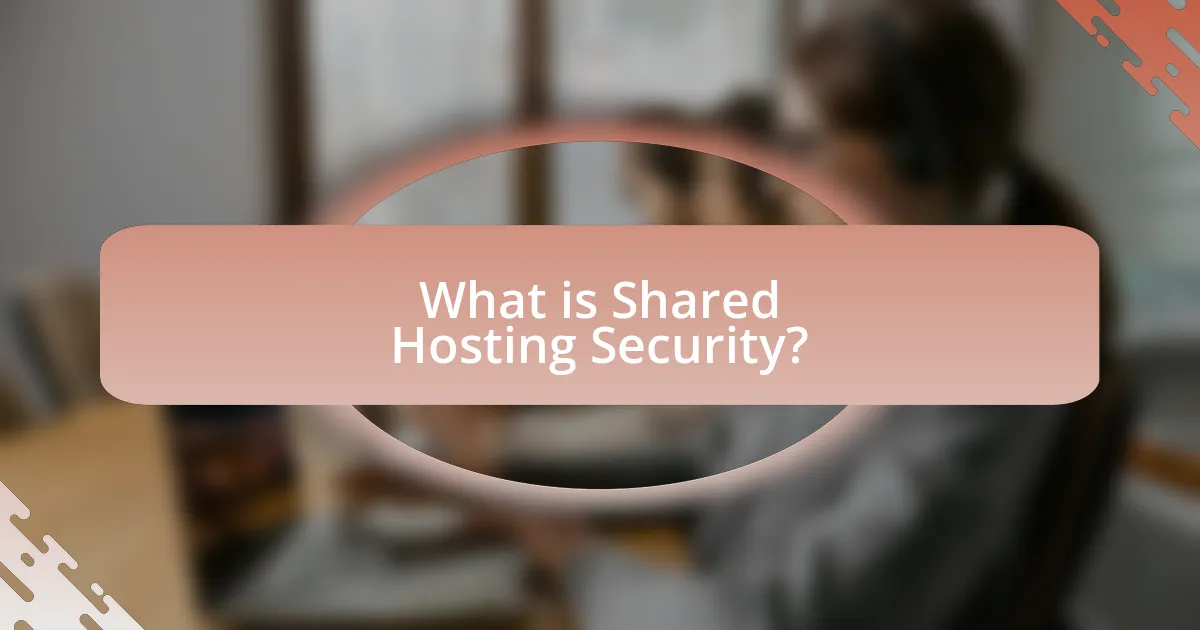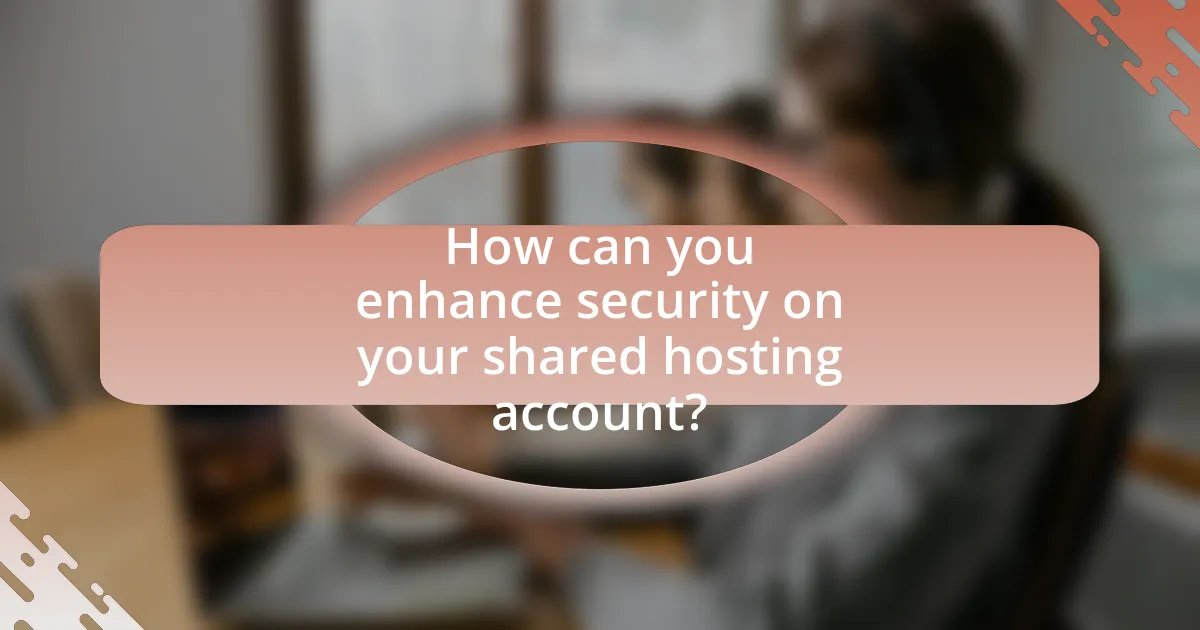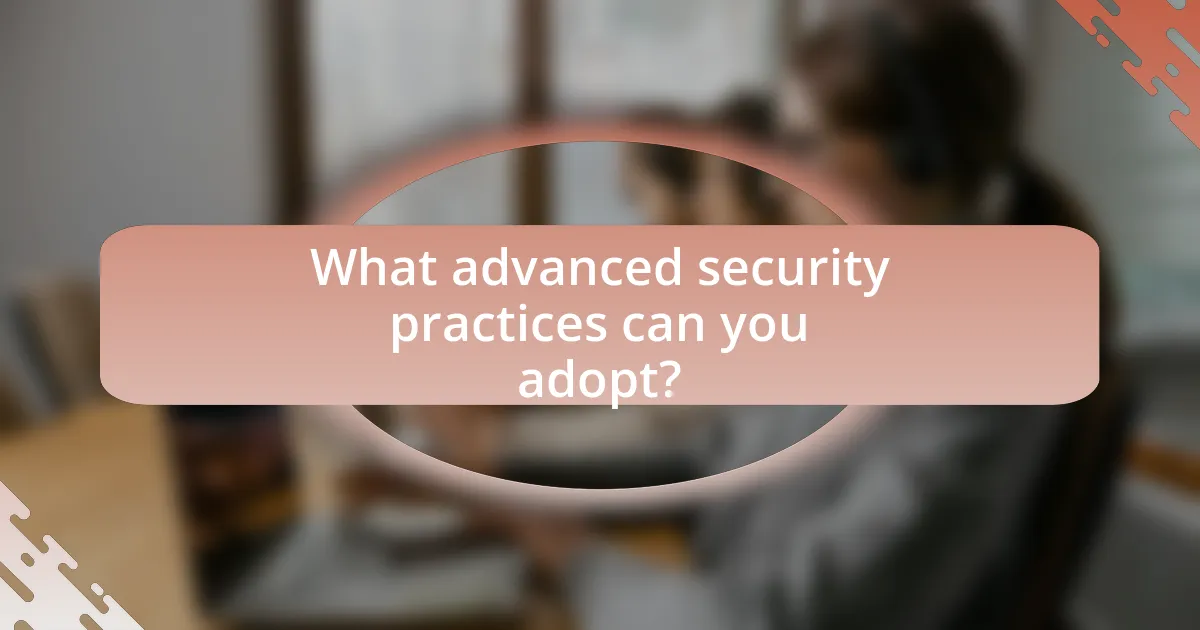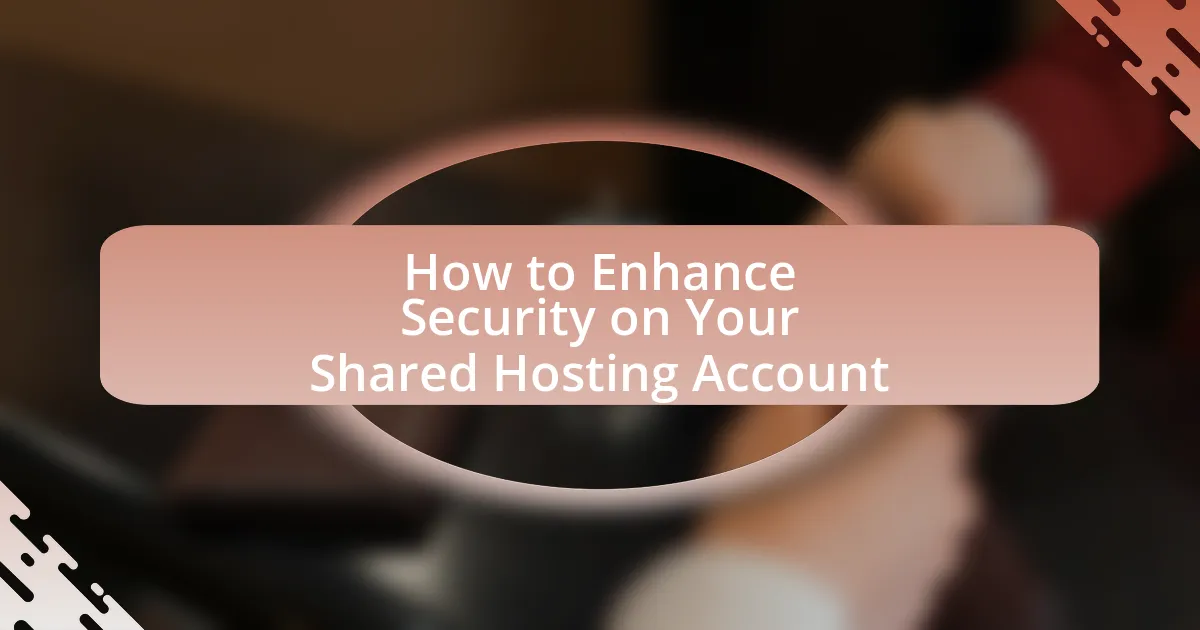Shared hosting security encompasses the measures and protocols designed to protect websites hosted on a shared server from unauthorized access and cyber threats. This article outlines the unique vulnerabilities associated with shared hosting, including the risks of cross-site contamination and inadequate security measures. It emphasizes the importance of robust security practices, such as strong password policies, regular software updates, and the use of security plugins, to safeguard sensitive data and maintain website integrity. Additionally, the article provides practical tips for enhancing security, including implementing two-factor authentication, configuring hosting environments, and conducting regular backups to mitigate potential threats.

What is Shared Hosting Security?
Shared hosting security refers to the measures and protocols implemented to protect websites hosted on a shared server environment from unauthorized access, data breaches, and other cyber threats. In shared hosting, multiple websites reside on the same server, making them vulnerable to attacks that can exploit weaknesses in one site to affect others. Effective shared hosting security includes the use of firewalls, regular software updates, strong password policies, and monitoring for suspicious activity. According to a report by the Cybersecurity & Infrastructure Security Agency, shared hosting environments are particularly susceptible to cross-site scripting and SQL injection attacks, highlighting the need for robust security practices to safeguard all hosted sites.
How does shared hosting security differ from other hosting types?
Shared hosting security differs from other hosting types primarily due to its multi-tenant environment, where multiple users share the same server resources. This setup increases vulnerability, as a security breach in one account can potentially affect others on the same server. In contrast, dedicated hosting provides isolated resources, reducing the risk of cross-account attacks. Additionally, VPS hosting offers a virtualized environment that enhances security through resource allocation and isolation, making it less susceptible to the risks inherent in shared hosting. The shared nature of resources in shared hosting means that security measures, such as firewalls and malware scanning, may be less robust compared to those available in dedicated or VPS hosting environments, where users have more control over security configurations.
What are the unique vulnerabilities associated with shared hosting?
Shared hosting presents unique vulnerabilities primarily due to the multi-tenant environment where multiple users share the same server resources. This setup increases the risk of cross-site contamination, where one compromised account can lead to unauthorized access to others on the same server. Additionally, shared hosting often lacks robust security measures, making it easier for attackers to exploit software vulnerabilities or misconfigurations. According to a study by the Ponemon Institute, 60% of organizations reported that shared hosting environments are more susceptible to security breaches compared to dedicated hosting solutions. This highlights the inherent risks associated with shared hosting, emphasizing the need for enhanced security protocols.
Why is shared hosting security crucial for website owners?
Shared hosting security is crucial for website owners because it protects sensitive data and maintains the integrity of their websites. In a shared hosting environment, multiple websites reside on the same server, making them vulnerable to attacks that can exploit weaknesses in one site to affect others. For instance, a security breach in one website can lead to unauthorized access to data, malware distribution, or even server downtime, impacting all hosted sites. According to a report by the Ponemon Institute, 60% of small businesses that experience a cyber attack go out of business within six months, highlighting the severe consequences of inadequate security measures. Therefore, ensuring robust security protocols in shared hosting is essential for safeguarding both the website owner’s assets and their users’ information.
What are the common threats to shared hosting accounts?
Common threats to shared hosting accounts include malware infections, DDoS attacks, and unauthorized access. Malware can spread from one compromised account to others on the same server, affecting multiple users. DDoS attacks can overwhelm server resources, leading to downtime for all accounts hosted on that server. Unauthorized access often occurs due to weak passwords or outdated software, allowing attackers to exploit vulnerabilities and gain control over accounts. According to a report by the Cybersecurity & Infrastructure Security Agency, shared hosting environments are particularly vulnerable due to their multi-tenant nature, which increases the risk of cross-account attacks.
How do hackers exploit shared hosting environments?
Hackers exploit shared hosting environments primarily by taking advantage of vulnerabilities in the software and configurations that allow them to access multiple accounts on the same server. In these environments, multiple websites share the same server resources, which can lead to security weaknesses if one site is compromised. For instance, if a hacker gains access to one account, they can potentially access others through misconfigured permissions or outdated software. According to a report by the Cybersecurity & Infrastructure Security Agency (CISA), shared hosting environments are particularly susceptible to cross-site scripting (XSS) and SQL injection attacks, which can be used to escalate privileges and gain unauthorized access to sensitive data across multiple sites.
What role do malware and phishing attacks play in shared hosting security?
Malware and phishing attacks significantly undermine shared hosting security by exploiting vulnerabilities in the shared environment. In shared hosting, multiple users operate on the same server, which means that a successful malware infection or phishing scheme targeting one account can compromise the entire server, affecting all users. For instance, a study by the Cybersecurity & Infrastructure Security Agency (CISA) indicates that shared hosting environments are particularly susceptible to cross-contamination from malware, as malicious scripts can spread across accounts if proper isolation measures are not in place. Additionally, phishing attacks can lead to unauthorized access to sensitive data, further jeopardizing the security of all hosted accounts. Therefore, the presence of malware and phishing threats necessitates robust security measures to protect shared hosting environments effectively.

How can you enhance security on your shared hosting account?
To enhance security on your shared hosting account, implement strong passwords and enable two-factor authentication. Strong passwords should be at least 12 characters long, combining uppercase letters, lowercase letters, numbers, and special characters, which significantly reduces the risk of unauthorized access. Two-factor authentication adds an additional layer of security by requiring a second form of verification, such as a code sent to your mobile device, making it more difficult for attackers to gain access even if they have your password. According to a study by Google, two-factor authentication can block 99.9% of automated attacks, demonstrating its effectiveness in securing accounts.
What basic security measures should you implement?
To enhance security on your shared hosting account, implement strong passwords, enable two-factor authentication, regularly update software, and monitor account activity. Strong passwords should be at least 12 characters long, combining letters, numbers, and symbols, as studies show that complex passwords significantly reduce the risk of unauthorized access. Two-factor authentication adds an additional layer of security, making it harder for attackers to gain access even if they have the password. Regular software updates are crucial because they patch vulnerabilities; for instance, the 2020 Cybersecurity Almanac reported that 60% of data breaches were linked to unpatched software. Monitoring account activity helps detect suspicious behavior early, allowing for prompt action to mitigate potential threats.
How can strong passwords improve your account security?
Strong passwords significantly enhance account security by making it more difficult for unauthorized users to gain access. A strong password typically includes a combination of uppercase and lowercase letters, numbers, and special characters, which increases the complexity and reduces the likelihood of successful brute-force attacks. According to a study by the National Institute of Standards and Technology (NIST), using passwords that are at least 12 characters long can exponentially increase the time required for an attacker to crack them, thereby providing a more robust defense against unauthorized access.
What is the importance of regular software updates?
Regular software updates are crucial for maintaining the security and functionality of systems. These updates often include patches that fix vulnerabilities, thereby reducing the risk of exploitation by malicious actors. For instance, according to a report by the Cybersecurity & Infrastructure Security Agency, 85% of successful cyberattacks exploit known vulnerabilities for which patches are available. Additionally, updates can enhance performance and introduce new features, ensuring that software remains efficient and user-friendly. Therefore, regular updates are essential for protecting shared hosting accounts from security threats and ensuring optimal performance.
How can you configure your hosting environment for better security?
To configure your hosting environment for better security, implement strong access controls, including using complex passwords and enabling two-factor authentication. Strong access controls reduce the risk of unauthorized access, as studies show that 81% of data breaches are linked to weak or stolen passwords. Additionally, regularly update your software and applications to patch vulnerabilities, as outdated systems are prime targets for attacks. Employing a web application firewall (WAF) can also protect against common threats like SQL injection and cross-site scripting, further enhancing your security posture.
What settings should you adjust in your control panel?
To enhance security on your shared hosting account, you should adjust the password settings, file permissions, and security features in your control panel. Password settings should include enforcing strong passwords and enabling two-factor authentication to prevent unauthorized access. File permissions must be set correctly to restrict access to sensitive files, ensuring that only authorized users can modify them. Additionally, enabling security features such as firewalls and malware scanning tools within the control panel can provide an extra layer of protection against potential threats. These adjustments are essential for maintaining the integrity and security of your hosting environment.
How can you limit user access to enhance security?
To limit user access and enhance security, implement role-based access control (RBAC) to assign permissions based on user roles. This method restricts users to only the resources necessary for their job functions, minimizing the risk of unauthorized access. According to a study by the National Institute of Standards and Technology (NIST), organizations that utilize RBAC can reduce security breaches by up to 50% due to improved access management. Additionally, regularly review and update user permissions to ensure they align with current job responsibilities, further strengthening security measures.

What advanced security practices can you adopt?
To enhance security on your shared hosting account, you can adopt advanced security practices such as implementing two-factor authentication (2FA), regularly updating software, and utilizing a web application firewall (WAF). Two-factor authentication adds an extra layer of security by requiring a second form of verification, significantly reducing the risk of unauthorized access. Regularly updating software ensures that you are protected against known vulnerabilities, as outdated software is a common target for attackers. A web application firewall helps filter and monitor HTTP traffic to and from your web application, providing an additional barrier against various types of attacks, including SQL injection and cross-site scripting. These practices are supported by cybersecurity research indicating that multi-layered security approaches are more effective in preventing breaches.
How can you utilize security plugins and tools?
To utilize security plugins and tools effectively, install reputable security plugins that provide features such as malware scanning, firewall protection, and login attempt monitoring. These plugins help to identify vulnerabilities and protect against unauthorized access, thereby enhancing the overall security of your shared hosting account. For instance, plugins like Wordfence and Sucuri are widely recognized for their robust security measures, including real-time threat detection and automated backups, which are essential for maintaining a secure environment.
What are the best security plugins for shared hosting?
The best security plugins for shared hosting include Wordfence, Sucuri Security, and iThemes Security. Wordfence offers a comprehensive firewall and malware scanner, protecting websites from various threats. Sucuri Security provides a robust suite of security features, including malware scanning and security hardening. iThemes Security focuses on preventing unauthorized access and includes features like two-factor authentication and brute force protection. These plugins are widely recognized for their effectiveness in enhancing security on shared hosting environments, as evidenced by their popularity and positive user reviews in the web development community.
How do these tools help in monitoring and protecting your account?
Monitoring and protection tools enhance account security by providing real-time alerts, automated backups, and vulnerability assessments. These features allow users to detect unauthorized access attempts, ensuring timely responses to potential threats. For instance, tools like intrusion detection systems can identify unusual login patterns, while regular vulnerability scans help pinpoint security weaknesses. According to a study by the Ponemon Institute, organizations that implement such monitoring tools reduce the risk of data breaches by up to 50%. This evidence underscores the effectiveness of these tools in safeguarding accounts against cyber threats.
What role does regular backup play in security?
Regular backup plays a critical role in security by ensuring data recovery in the event of data loss, corruption, or cyberattacks. When a system is compromised, having recent backups allows for the restoration of data to a secure state, minimizing downtime and data loss. According to a study by the Ponemon Institute, organizations that regularly back up their data can recover from ransomware attacks 50% faster than those that do not. This highlights the importance of regular backups as a proactive security measure, enabling businesses to maintain operational continuity and protect sensitive information.
How often should you back up your shared hosting account?
You should back up your shared hosting account at least once a week. Regular weekly backups help ensure that you can restore your website to a recent state in case of data loss, corruption, or security breaches. According to a study by the Online Backup Association, 30% of people have lost all their files due to data loss, highlighting the importance of frequent backups to mitigate risks.
What are the best practices for storing backups securely?
The best practices for storing backups securely include using encryption, implementing access controls, and regularly testing backup restoration. Encryption protects data from unauthorized access, ensuring that even if backups are compromised, the information remains secure. Access controls limit who can view or modify backups, reducing the risk of accidental or malicious changes. Regularly testing restoration processes verifies that backups are functional and can be restored when needed, which is crucial for data recovery. According to a study by the Ponemon Institute, 60% of organizations that do not test their backups experience data loss, highlighting the importance of these practices.
What are the best practices for maintaining ongoing security?
The best practices for maintaining ongoing security include regularly updating software, implementing strong password policies, and conducting routine security audits. Regular software updates patch vulnerabilities, reducing the risk of exploitation; for instance, a 2020 study by the Cybersecurity and Infrastructure Security Agency found that 85% of successful cyberattacks exploited known vulnerabilities that could have been mitigated by timely updates. Strong password policies, such as requiring complex passwords and enabling two-factor authentication, significantly decrease the likelihood of unauthorized access. Additionally, routine security audits help identify and rectify potential weaknesses in the system, ensuring that security measures remain effective against evolving threats.
How can you stay informed about security threats and updates?
To stay informed about security threats and updates, regularly follow reputable cybersecurity news sources and subscribe to security bulletins from organizations like the Cybersecurity and Infrastructure Security Agency (CISA) and the National Institute of Standards and Technology (NIST). These sources provide timely information on vulnerabilities, threats, and best practices. For instance, CISA publishes alerts and advisories that detail emerging threats and recommended actions, while NIST offers guidelines and updates on security standards. Engaging with these resources ensures you receive accurate and relevant information to enhance the security of your shared hosting account.
What steps should you take if your account is compromised?
If your account is compromised, immediately change your password to a strong, unique one. This action prevents unauthorized access and secures your account. Next, enable two-factor authentication (2FA) to add an extra layer of security, making it harder for attackers to gain access even if they have your password. Additionally, review your account activity for any unauthorized transactions or changes, and report these to your service provider. It is also essential to scan your devices for malware, as compromised devices can lead to further breaches. Finally, inform your contacts about the breach to prevent them from falling victim to potential phishing attempts.
What practical tips can you follow to enhance your shared hosting security?
To enhance your shared hosting security, implement strong passwords and enable two-factor authentication. Strong passwords should be at least 12 characters long, combining uppercase letters, lowercase letters, numbers, and special characters, as this significantly reduces the risk of unauthorized access. Two-factor authentication adds an additional layer of security by requiring a second form of verification, such as a text message or authentication app, which can prevent unauthorized logins even if passwords are compromised. Regularly updating software and plugins is also crucial, as outdated versions can contain vulnerabilities that hackers exploit; for instance, a study by the Ponemon Institute found that 60% of data breaches are linked to unpatched vulnerabilities. Additionally, using a web application firewall (WAF) can help filter and monitor HTTP traffic between a web application and the Internet, providing protection against common attacks like SQL injection and cross-site scripting. Lastly, regularly backing up your data ensures that you can recover quickly in case of a security incident, with 30% of businesses reporting that they would not survive a major data loss.


